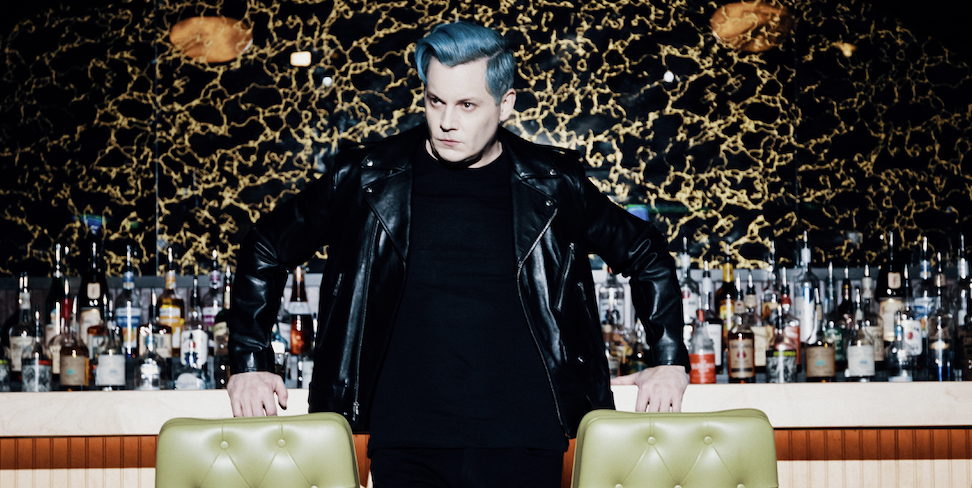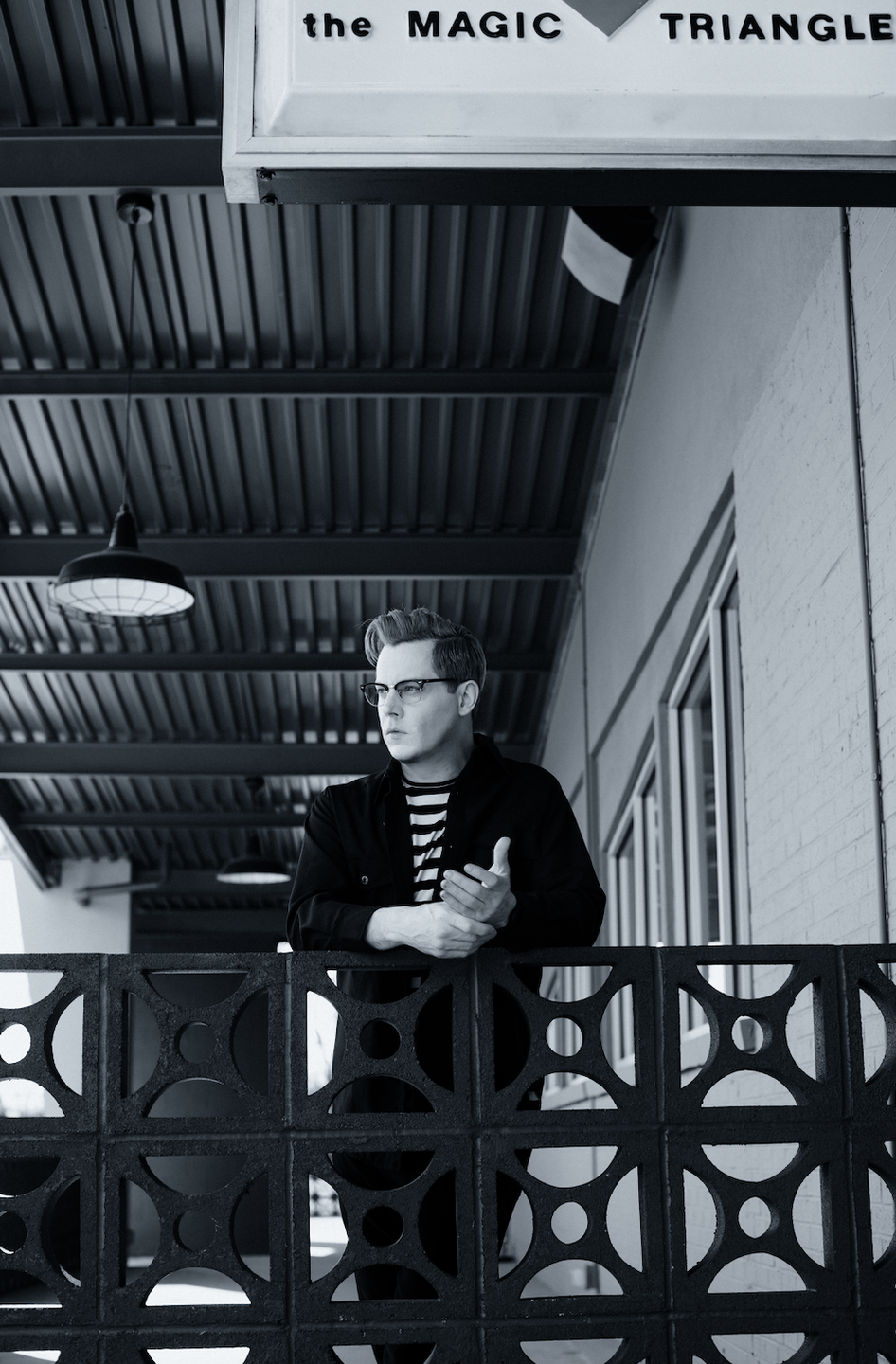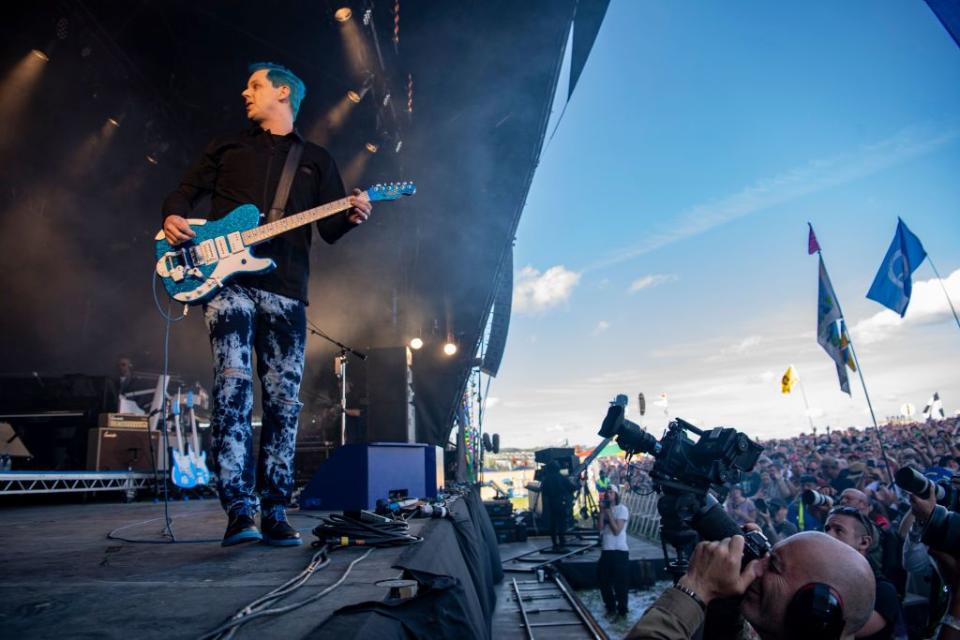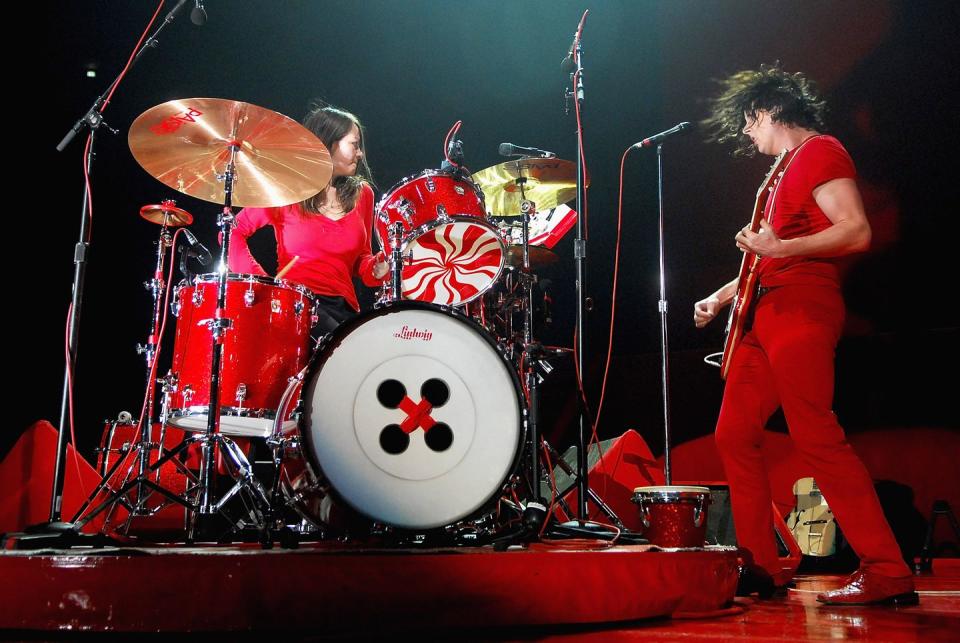Jack White Is Calling From the Future

- Oops!Something went wrong.Please try again later.
"Nobody wants to be the bad guy," says Jack White, voice beaming through my laptop from France, via Zoom. We're talking about parenting—maybe not the most rock n' roll of topics for one of the biggest shredders on the planet—and wanting to figure your own shit out so your kids don't have to. "Nobody wants to get out any harsh lessons to their own kids," he continues. "It's unappealing when you've been through harsh lessons. But that's not exactly the right thing to do. We all need lessons of different kinds—gentle, and sometimes harsh, and sometimes sad—to get to these really healthy places."
At 47, White's learned a few. He's been one-half of the biggest band on the planet, a troubadour, a record label boss, and a tabloid fascination. A rock god, a husband—something he became again earlier this year when he got married on stage in Detroit—and a dad, now to teenagers. Age has made him more accepting, he says, even of negative things. He's made it, in other words, to that healthy place.
In the middle of a year that saw him launch a massive world tour and drop two albums—Fear of the Dawn, out in April, Entering Heaven Alive, out today—Esquire caught up with White about returning to the road, antique conventions, and showbiz. This conversation has been edited for clarity and length.
You’re a few hours ahead of me—
I’m calling from the future, yes.
—in Europe, out on tour. What has it been like? Are shows the same as they always were?
What’s the future like?
[Laughs] Yep, tell me everything.
Well, Trump’s in prison. The Supreme Court have all been impeached. It’s great. I can’t wait ‘til you get here.
But, to answer your question for real. The road, it’s been almost a rebirth. That's the longest break I've taken from touring since I've been an adult. And whenever you take that long of a break from anything you wonder, "Wow, will I still enjoy this? Will I still find some catharsis from it? Am I still any good at doing these certain things? Or am I older now?" This time was the first time I didn’t really take anything for granted.
I went to the Barclays stop in Brooklyn. It felt curiously joyful for a big rock show.
That’s what we’re experiencing. And I'm definitely not preaching that to anybody, like, "We're back, and everything's normal, and everything's okay." But you can see the look of exhaustion on the world as we travel around, that COVID took the wind out of our sails. We're finally getting some of that wind back.
Live music is, obviously, something that just can’t get replicated for at-home consumption the way other forms of art can.
We felt that when we did the Saturday Night Live performance. It seemed it touched a nerve with the country—that everyone really wanted live music back, like that was how we connected with people so well that day. It was giving them a taste of what live music used to be like. "Oh, wow. Please. This makes me want to go see all my favorite bands"—that's what people were telling me. I took that as a really good omen that people still desire this.
I say this a lot but, there really is nothing more exciting than the first three seconds of a rock show. Everything’s plugged in and buzzing. You’re like desperate to know what the opening note is going to be, what song is going to kick off. I felt that even watching that SNL performance—and I think it mattered that it was rock music to get that reaction.
You get the feeling like it's a difference between someone starting up, you know, a Volkswagen Beetle and starting up the engine of a tank. The engine of a tank, you're almost like, "Oh my God, what's going to happen next?" It's scary when a rock and roll concert starts.
What does a day on the road look like for you at this point? Are you getting out and exploring?
As I've gotten through the years, I started to go see things I would've skipped many times. I wouldn't have gone and seen the Eiffel Tower when I was 20. I would've just been like, "Whatever." When I'm 38 or something or 42, then those things are, "I should finally go in there and see it." Less cynical and more understanding of why things have the representation that they have in the world.
And then there are still some things that are really fake. I went and saw Checkpoint Charlie in Berlin. But there's nothing there. It's a fake Checkpoint Charlie! It's a replica. There's the Hard Rock Cafe and McDonald's on one side, Starbucks on the other. It's an Instagram hell. But we were laughing about it. We still took a photo next to it. When I was 25, I would have been like, "Oh, get me away from this total fake Hollywood bullshit." You can appreciate the negative things, is what I'm saying, even with age.
It's amazing how much of our 20s are wasted with that energy.
Yeah. You think about people who've had the near-death experiences—or astronauts who've seen the earth from space—they get an immediate perspective and are able to appreciate lots of things. The same thing does happen with age, it's just spread out over many, many years. And then suddenly, you appreciate somebody cooking you a meal because now you know how hard that is. Those are the good things about as the years go by.

Going into the Brooklyn show, it was the first time going to a Jack White show in a while where I felt like, “Who the hell am I going to see at this concert?” And it really was a lot of old Stripes fans, a lot of rockers, a lot of young kids—some with parents, many on their own. It felt random, almost.
When I was a bus boy at the restaurant in the Fox Theatre in Detroit, I was 16. And it was learning about showbiz before you really knew it. Every show would be a different crowd of people. There would be a crowd that would see a magic show. Then there would be a R&B gospel show and there'd be a whole different crowd. And then the Black Crowes would come, and that was a whole different crowd. It was almost laughable at times. Post-Internet, a lot of that has disappeared.
A musician’s relationship with the road can be complicated. It’s a lot of work, it’s a lot of time away. You’ve got kids at home. Where are you with it these days?
I changed my method of touring once my kids were born and I'm still using that method, which was to try to make everything two weeks on, two weeks off as much as possible. It's really a bad business move, because you don't make any profit until about a week and a half into a tour, but if I couldn’t do that, I would've just said, "Well, then I just won't tour anymore, because I have children." And I think it's worked out. Nothing will be perfect. We have a family with the mom is a model and the dad is a musician. Scheduling is not the number one hit on the chart.
Your kids are teenagers now. What level of impressed—or not—are they with Jack White the Rockstar.
They're huge music lovers. And they've been exposed to so much music around them, so many living rooms full of bluegrass musicians—Radiohead recording in the backyard—or Loretta Lynn stopping by to sing something. And when you're younger, you almost want to tell them, "Oh my God, that's Wanda Jackson who just talked with you! You know that?" It's hard to have perspective because their perspective is already so jagged.
I’m hearing that fasting has become a big part of your routine.
I started off on January 1st, 2020, not eating any sugar. I was going to just do that for a month. And then the next month I stopped eating carbohydrates. And it's been, what, two and a half years now, I haven't had any sugar or carbohydrates. And as painful as that can be at times, when you're out to eat with everybody in the band and everyone's ordering crème brulée and giant sandwiches, I feel the healthiest I've ever felt. The fasting part is just another attempt to getting to more natural ideas of what things were like for early, primitive man. We know primitive man went through periods of time where there wasn't any food. Our bodies are prepared for that, and the energy you get from that is pretty interesting.
I did, I think, a five day fast doing a bunch of writing for this Entering Heaven Alive record. I stayed by myself and just had water and black coffee for five days, that was it. By the third, fourth day, you can't sleep anymore. People think you just slowly get quieter and want to sleep all day long, have no energy. It's not like that. Your body's actually kicking your ass to get out there and find food.

Tell me about the surprise set at Glastonbury.
I didn't know for sure if it was the right mood, because this is an idea they have, they have a larger act play a surprise set in the middle of the day on this smaller stage—and I've headlined this festival before, so, you know what that feeling is like. I didn't know what this might feel like. Sometimes it's hard for me because my music and daylight don't exactly mix. If you're, what do you call, what's the guy who does Margaritaville and all that, you know?
Jimmy Buffet.
Jimmy Buffett—you're fine. You're in your zone. That's a great place to be at a festival in a daytime. So, I was walking towards the stage going, "Man, the sun. Ah, I don't know." But God, that crowd was just, you could tell that they're just in love with music.
You’ve been in how many bands, run a record label. At this point, are you surprised by what songs take off or do you have a pretty well-trained weather vane?
It's impossible to really tell. You constantly monitor it, but it's almost trying to beat the house in a casino. You can be a pretty good player at blackjack, but in the end, they're going to get you. What's great is you get these glimmers of hope, like recently with Stranger Things, with the Kate Bush and Metallica songs having a whole new life. I'm so happy for those artists and I'm happy for those songs, because those are good songs. But I'm really happy for the idea that you never know what's going to happen—that people can still get excited about a song and have it be a big deal.
That's something that we need reminders of every once in a while. The top 10 in the '80s, for example, God, we took it for granted. Didn't we? It was like Prince here, Michael Jackson there, Guns N' Roses here. In the '90s, we all looked back and said, "Oh, wow, the '80s was full of such bad music.” But now you look back, it’s like, "If a band nowadays had one of these songs, they would be the biggest band on the planet."
Entering Heaven Alive is really quiet, very much an album in the lane of ‘60s folk music in America. What place were you in, mentally, when you were making it?
Part of it was me being holed up in Kalamazoo with just acoustic guitar and piano. I knew, I'm not going to be writing electric guitar riffs, it's going to be creating songs from nothing. I'm in a room with no inspiration. I'm not reading the Internet every day. I'm not reading newspapers, watching television—I was just in a room by myself. And pulling out phrases and words, here, to trigger things and writing things down that might lead me down a path. I'm always trying to use different writing techniques I've never used before, to see if that's a new path for me. But when I try a new technique and it works, I'm afraid to use it again. That's something I have to figure out as I get older, how I want to attack that, repeating a technique.
Is that insecurity that it won’t work again?
In my early 20s, I got really into surf music, and really into rockabilly, and really into different punk, and different Detroit garage rock, and things like that. And every time I would see a band do a recreation, like a retro band, I would say, "God, I love this, but I would never want to be only one thing." I would feel closed off.
When something like this starts coming out in the writing process, are you excited in real time?
In the White Stripes, I already had gone through many scenarios where it's hard to be excited because Meg is so quiet. Something would come out of you and you would think, "Oh my God, what do you think?" You'd be very excited, when she would just be silent. And the engineer is getting paid—he's not in your band. So he's just sitting there. I got used to it early on, being able to just look in the mirror and tell myself, "No, man, that's pretty good." And it takes the kind of right personality. You can't have too big of an ego, but you have to have enough of one to convince yourself to keep going forward.
There does need to be some level of belief in your talent to just get up on stage, or to even think about one day getting up on stage.
It’s a gentle confidence that pushes you to think, "This is actually worth my energy and to make the people around me work on that." When I was 21 or 25, and other people were setting up, working on the lighting and whatever, you might come off stage and say, "Oh, that was a horrible show. I'm so disappointed in myself and everything that went down." Then, I would immediately think, “Man, all those guys set up all that equipment. Those trucks drove here. All of these people paid money to come and be in that room. Am I even allowed to be disappointed?" I've always had empathy for all the workers trying to create a scenario for something great to happen.
When you go on tour. You're trying to do that every damn day. It's not flicking a light switch. I also don't do drugs. I have to find all kinds of methods to get myself excited, and warmed up, and into a zone where I'm not just Joe Schmo walking off the street onto a stage and plunking some notes down. It’s important that I get somewhere. But I always appreciate all the other people involved in trying to create it.

Was there ever a moment in your career when you felt like the confidence was tipping into ego dangerously?
I came out of a really cynical garage rock, hipster scene in Detroit. So I had already been baptized in those cynical waters, to really make sure that I was keeping things legitimate and doing things for the right reasons. I had already learned the lessons of sitting around in rooms, and listening to record collectors and people complain about all the things that they disliked about pop culture.
And there were things that we learned that were okay to do. I remember walking on the red carpet for the first time in the White Stripes and thinking, "Oh my God, this is so fake and so disgusting. I will never do this again." I felt like throwing up. But I learned it's okay to do these things at times. You just don't live by it. If I had been someone who's living and dying for that attention, then it would be really a bad thing. It would be like a drug.
Some people will close off, and stop doing all that, and really hurt their own creativity and their own livelihood, and their own careers, because they aren’t able to be flexible about it. You got to walk into some fake rooms in showbiz. And it's tough. And you got to have enough of a personality—enough of a confidence—to stay true to yourself. But I think, to answer your question, the environment I came out of helped me figure that out a lot faster.
So fame isn’t a vice. Drugs aren’t a vice. What are your habits you’ve had to kick?
Eh, there were times where you debate how much the inspiration you have could possibly be affected by some other conditions that you may not know you have. I think I work pretty well with others, but you see what motivates certain people. You go, "Oh, okay. Now I get why you're involved in all this. There was an incident where someone said you were no good at this. And you're spending the rest of your life proving them wrong. Great. Nothing wrong with that." It makes you reflect and wonder, "Maybe there are things about myself that are actually just hang-ups or baggage that I don't even realize and maybe will never realize until the day I die about why I am interested in this particular topic."
I grew up in a family with lots of older brothers who are musicians. Do I think right now I'm trying to prove something to any of them? I'm being honest with you, it doesn't feel like that. Doesn't feel I was going to prove something to my dad or anything like that. I don't have that, but who knows?
There's got to be some reasons why certain things are motivating. To this day, I have collections of things. And when I was a kid, I had different kinds of collections, a little army man collection, or the railroad things from the near the railroad tracks. And well, why? I don't know why I do that. Why does anyone? I've grown to love those people. You know? I'll go to antique conventions and I'll talk to someone who collects something I could give a fuck about, like Hummel figurines or something. I don't give a damn about this, but I love that this person is obsessed with the intricacies and the minutia of this topic.
I certainly started having more moments of existential questioning of “well, why am I like this” when I became a parent. You worry about what you’ll pass down.
I used to think when my kids were young, "God, I hate that they're going to grow up and learn about war, and famine, and how mean human beings can be to one another, and they're going to get bullied in the playground, or they're going to be drafted into an army." You think about all those things that could happen that you don't want them to experience. But also, the world doesn't look too kindly on people who live sheltered lives.
Culturally, we’ve long loved to separate our business people from our artists. Third Man Records denies that boundary.
I think my cynicism about artistry was the pretense that artists don't care about business, and don't know anything about it, and don't take advice from people about what they're doing. They just so happened to accidentally write this brilliant song. And it just so happened to accidentally get put on a record, and accidentally put in stores, and, "Oh, whoops, I'm on television.” And, “Whoops, somebody dressed me.” And, “Whoops, I'm a star." Absolutely untrue, almost never the case. That pretense is always weird.
There was, at one point a time where you just hoped to God that somebody was going to hear your music. What’s the goal now?
I'm always in search of the best environment to work in. I still feel the same way I felt maybe 15, 20 years ago when I first started playing bigger rooms, which is after about 5,000 people, it becomes a different kind of showbiz. It's less about the music, and you're more prone to want to have pyrotechnics, and lasers, and cannons, and all that trickery just to get that many people's attention. You know, if you're an amazing jazz trumpet player, there's only so many people in each town that can really sit down and dig what's going on with you. And then you might be EDM guy who can have 50,000 people jumping up and down. You just got to find that room that makes sense. To me, I don't care what that amount is. If that amount is 500 and that's it, that's amazing. If that amount is 10 million, that's amazing, too.
You Might Also Like

